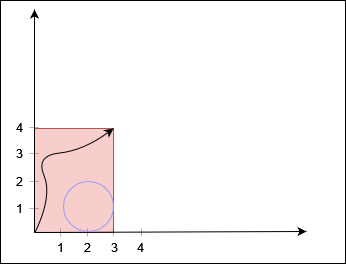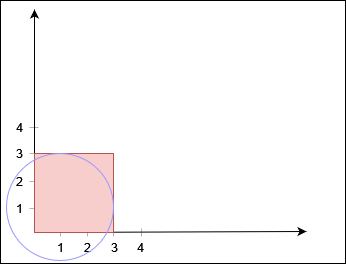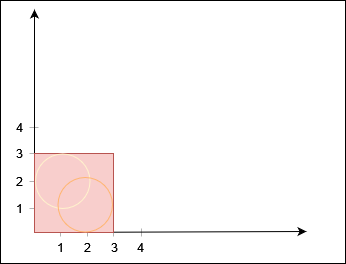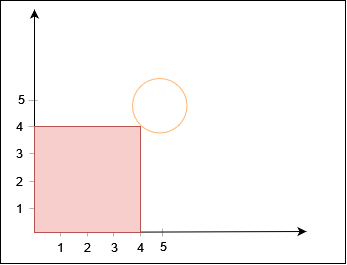LeetCode-in-Java
3235. Check if the Rectangle Corner Is Reachable
Hard
You are given two positive integers X and Y, and a 2D array circles, where circles[i] = [xi, yi, ri] denotes a circle with center at (xi, yi) and radius ri.
There is a rectangle in the coordinate plane with its bottom left corner at the origin and top right corner at the coordinate (X, Y). You need to check whether there is a path from the bottom left corner to the top right corner such that the entire path lies inside the rectangle, does not touch or lie inside any circle, and touches the rectangle only at the two corners.
Return true if such a path exists, and false otherwise.
Example 1:
Input: X = 3, Y = 4, circles = [[2,1,1]]
Output: true
Explanation:

The black curve shows a possible path between (0, 0) and (3, 4).
Example 2:
Input: X = 3, Y = 3, circles = [[1,1,2]]
Output: false
Explanation:

No path exists from (0, 0) to (3, 3).
Example 3:
Input: X = 3, Y = 3, circles = [[2,1,1],[1,2,1]]
Output: false
Explanation:

No path exists from (0, 0) to (3, 3).
Example 4:
Input: X = 4, Y = 4, circles = [[5,5,1]]
Output: true
Explanation:

Constraints:
3 <= X, Y <= 1091 <= circles.length <= 1000circles[i].length == 31 <= xi, yi, ri <= 109
Solution
import java.util.Arrays;
@SuppressWarnings("java:S135")
public class Solution {
public boolean canReachCorner(int x, int y, int[][] circles) {
int n = circles.length;
DisjointSet ds = new DisjointSet(n + 5);
// Special nodes for boundaries
int leftBoundary = n + 3;
int topBoundary = n;
int rightBoundary = n + 1;
int bottomBoundary = n + 2;
int i = 0;
for (int[] it : circles) {
int xi = it[0];
int yi = it[1];
int ri = it[2];
if (yi - ri >= y || xi - ri >= x) {
continue;
}
if (((xi > (x + y) || yi > y) && (xi > x || yi > x + y))) {
continue;
}
if (xi <= ri) {
ds.dsu(i, leftBoundary);
}
if (yi <= ri) {
ds.dsu(i, topBoundary);
}
if (x - xi <= ri) {
ds.dsu(i, rightBoundary);
}
if (y - yi <= ri) {
ds.dsu(i, bottomBoundary);
}
i++;
}
// Union circles that overlap
for (i = 0; i < n; i++) {
int x1 = circles[i][0];
int y1 = circles[i][1];
int r1 = circles[i][2];
if (y1 - r1 >= y || x1 - r1 >= x) {
continue;
}
if (((x1 > (x + y) || y1 > y) && (x1 > x || y1 > x + y))) {
continue;
}
for (int j = i + 1; j < n; j++) {
int x2 = circles[j][0];
int y2 = circles[j][1];
int r2 = circles[j][2];
double dist =
Math.sqrt(
Math.pow(x1 - (double) x2, 2.0) + Math.pow(y1 - (double) y2, 2.0));
if (dist <= (r1 + r2)) {
ds.dsu(i, j);
}
}
}
// Check if left is connected to right or top is connected to bottom
if (ds.findUpar(leftBoundary) == ds.findUpar(rightBoundary)
|| ds.findUpar(leftBoundary) == ds.findUpar(topBoundary)) {
return false;
}
return ds.findUpar(bottomBoundary) != ds.findUpar(rightBoundary)
&& ds.findUpar(bottomBoundary) != ds.findUpar(topBoundary);
}
private static class DisjointSet {
private final int[] parent;
private final int[] size;
public DisjointSet(int n) {
size = new int[n + 1];
Arrays.fill(size, 1);
parent = new int[n + 1];
for (int i = 0; i <= n; i++) {
parent[i] = i;
}
}
public int findUpar(int u) {
if (u == parent[u]) {
return u;
}
parent[u] = findUpar(parent[u]);
return parent[u];
}
public void dsu(int u, int v) {
int ulpu = findUpar(u);
int ulpv = findUpar(v);
if (ulpv == ulpu) {
return;
}
if (size[ulpu] < size[ulpv]) {
parent[ulpu] = ulpv;
size[ulpv] += size[ulpu];
} else {
parent[ulpv] = ulpu;
size[ulpu] += size[ulpv];
}
}
}
}

